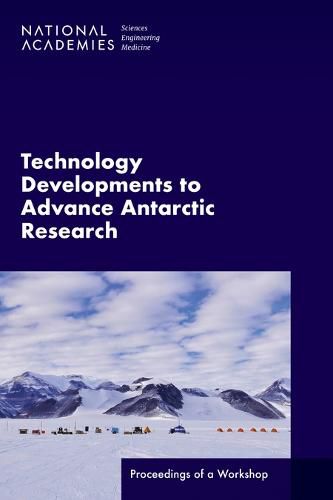Readings Newsletter
Become a Readings Member to make your shopping experience even easier.
Sign in or sign up for free!
You’re not far away from qualifying for FREE standard shipping within Australia
You’ve qualified for FREE standard shipping within Australia
The cart is loading…






Antarctica and the Southern Ocean are important research locations for many scientific disciplines, including oceanography, biology, and astronomy. Because of its remoteness and the extreme and dangerous weather conditions in which researchers must operate, research in this region presents many unique challenges. New and improved technologies can make Antarctic research safer, more efficient, and capable of covering a greater spatial and temporal range, all while minimizing the costs and environmental impacts of this research. At the request of the National Science Foundation Office of Polar Programs, the Polar Research Board of the National Academies of Sciences, Engineering, and Medicine convened a workshop on May 3-5, 2022, to solicit broad community ideas regarding how technological developments can advance and expand Antarctic research and polar research more generally. Workshop participants discussed recent and potential technological breakthroughs, cross-cutting research themes, and how new technologies can facilitate broader, more diverse participation in Antarctic research. This publication summarizes the presentations and discussions of the workshop.
Table of Contents
Front Matter 1 Overview 2 Introduction 3 Technologies for Research and Observational Instrumentation 4 Power and Energy for Polar Research 5 Data and Communications for Polar Research 6 Technology Advances to Expand Participation in Polar Research 7 Partnerships and Mechanisms to Facilitate Development and Application of New Research Technologies 8 Concluding Thoughts References Appendixes Appendix A: Statement of Task Appendix B: Planning Committee Biographies Appendix C: Workshop Agenda
$9.00 standard shipping within Australia
FREE standard shipping within Australia for orders over $100.00
Express & International shipping calculated at checkout
Antarctica and the Southern Ocean are important research locations for many scientific disciplines, including oceanography, biology, and astronomy. Because of its remoteness and the extreme and dangerous weather conditions in which researchers must operate, research in this region presents many unique challenges. New and improved technologies can make Antarctic research safer, more efficient, and capable of covering a greater spatial and temporal range, all while minimizing the costs and environmental impacts of this research. At the request of the National Science Foundation Office of Polar Programs, the Polar Research Board of the National Academies of Sciences, Engineering, and Medicine convened a workshop on May 3-5, 2022, to solicit broad community ideas regarding how technological developments can advance and expand Antarctic research and polar research more generally. Workshop participants discussed recent and potential technological breakthroughs, cross-cutting research themes, and how new technologies can facilitate broader, more diverse participation in Antarctic research. This publication summarizes the presentations and discussions of the workshop.
Table of Contents
Front Matter 1 Overview 2 Introduction 3 Technologies for Research and Observational Instrumentation 4 Power and Energy for Polar Research 5 Data and Communications for Polar Research 6 Technology Advances to Expand Participation in Polar Research 7 Partnerships and Mechanisms to Facilitate Development and Application of New Research Technologies 8 Concluding Thoughts References Appendixes Appendix A: Statement of Task Appendix B: Planning Committee Biographies Appendix C: Workshop Agenda